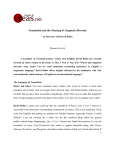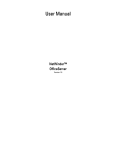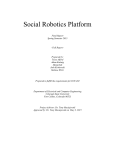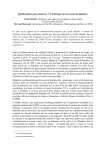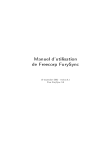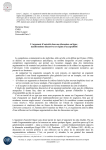Download Face Off: Identity in French On
Transcript
Face Off: Identity in French On-line Debate1 BARBARA E. HANNA For many commentators the defining characteristic of Internet discussion is its facelessness. In the current state of technological play, it is rare to see our on-line interlocutors or to be seen by them: the self is, quite precisely, said. This paper brings together two lines of thought proceeding from this simple observation in order to consider the use of Internet discussion in teaching French, and specifically the issue of on-line identity asserted by language learners. Reduced channels of communication Firstly, we note that much talk about pedagogical uses of the Internet underlines the “reduced channels” of on-line communication.2 There is no face, nor tone of voice, nor gesture. In the eyes of many educationalists, this reduction produces simplification: online communication is not different in kind, but lacking; it is the skim milk to the full cream richness of face-to-face communication. In holding this view, they choose to ignore issues of generic specificity and the possibility that the nature of computermediated communication might influence communicative and cultural conventions. 1 My thanks go to Juliana de Nooy, collaborator on a larger project on on-line communication, for her input into this paper. I also record my gratitude to those who worked as research assistants on the Internet fora quoted: Lara Cain, Peter Cowley and Wendy Ward. The power of the face in guaranteeing authentic identity For a second group, including sociologists, ethnologists, psychologists and writers of various television series, the interest of this facelessness is that it has spawned a hitherto unknown mode of communication where onscreen, unseen interlocutors are fictional creations of human demiurges. After all, the English “faceless” denotes “lack of identity”. While there is no French cognate for faceless, there is nonetheless a cluster of everyday metaphors about arriving at the truth via the revelation of the face: we may note the words démasquer, dévoiler. Face is the guarantor of identity: without access to it, we apparently enter the domain of uncertainty, indeed deceit. Thus Jauréguiberry proclaims: Ce relatif “décollement” des internautes en regard des lieux, corps et statuts va permettre l’apparition d’un type d’action totalement inédit : celui de la manipulation identitaire à laquelle un individu va pouvoir se livrer en superposant une identité virtuelle à son identité réelle, une identité fantasmée à son identité sociale. 3 Of identity in the Internet discussion forum, he says : “L’individu manipule sa propre identité afin d’être réellement pris par ses interlocuteurs pour celui qu’il fantasme d’être”.4 Forget Polonius. Saying the Self in a Foreign Language When a colleague5 introduced Internet fora into the teaching of argumentation to students of French, it was the potential for disguise that appealed to me. Communication on-line seemed to offer a means of emancipation from the role of language learner, that role in 2 Rice, for example, refers to the Internet’s “restricted channels of communication.” Craig D. Rice, “Bring intercultural encounters into classrooms: IECC electronic mailing lists”, Technical Horizons in Education, 23(6), (1996), 60-63. 3 Francis Jauréguiberry, “Le moi, le soi et Internet”, Sociologie et Sociétés, 32.2, (2000), 136-152, (p. 136). 4 Jauréguiberry, p. 137. 5 Béatrice Atherton, whom I gratefully acknowledge as the person to bring the use of Internet fora in teaching to my attention. which one is type-cast by interlocutors who, hearing a non-standard accent, seeing nonverbal signs of unease, apportion one the limited conversational share of the outsider, who is only able to answer questions about himself/herself, home, and just possibly, the trip so far. Furthermore, as a teacher, I had seen too many students who put themselves in that role, who would only ever imagine speaking French “not badly for an Australian/Swede/Singaporean” and who were reluctant to engage with genres that would stretch their competence and require them to adopt speaking positions where being the pet foreigner would not work. If it is possible to (re)create the self on-line, and if the channels of communication are reduced, computer-mediated communication could be an ideal opportunity for students to create themselves, with relative ease, as speakers of another language. However, rather than jumping to that conclusion, this paper will question some assumptions about the radical difference of identity on-line and then examine the use of on-line fakery before returning to the issue of student use of on-line discussion. The particular genre of on-line interaction supplying my examples is that of Internet fora attached to the websites of French newspapers. These are general interest, asynchronous discussion facilities where a wide range of topics is discussed, generally related to current affairs and where there is some level of commitment to a notion of “quality” debate. (The commitment to “quality” does not however always extend to the linguistic accuracy of contributions, as will become evident in later, verbatim quotations.) Despite widespread low expectations about sincerity on-line, in practice these discussion fora are not riddled with challenges to identity and honesty. Yet such moments can be found and consideration of some such instances will be helpful. Our first example from a newspaper discussion forum may initially seem like a detour, given its American origins. However, it is useful to my argument in that it very powerfully destabilizes some of the claims about the brave new world of unseeable identity. The Strange Case of razzmattazz0 On 15 October 2002 the New York Times messageboard “Gay Pride: the Fight for Civil Rights”6 carries the breaking story of razzmatazz0’s day. Razzmatazz0 (self-identified as heterosexual) has announced his intention to ask a co-worker if he is gay. But not all participants in discussion are convinced of razzmatazz0’s sincerity. Is the story fact or fiction? If you are even telling the truth at all, you need to be very careful. You are prying into matters that are none of your business.7 Your posts have some traits to them that make me wonder if you are being truthful here about all this.8 His claim of questioning the coworker doesn’t ring true anyway hon.9 Is razzmatazz0 a straight Christian office worker with an overwhelming (and for him inoffensive) urge to know his colleague’s sexual orientation? Is he truly someone who needs to know, won’t approve, but won’t let it interfere with work? Are the accusations of dishonesty well-founded? Without access to non-verbal clues, no-one can see razzmatazz0’s shifty eyes, or offended sincerity. (Nor, indeed, whether he is a violent homophobe, an anti-Christian propagandist, or a researcher of discrimination in the workplace.) The on-line world does indeed seem beset by uncertainties. 6 http://forums.nytimes.com. Messages are periodically wiped from the site. Bob_maddox, (1:47 pm), New York Times – Gay Pride: The fight for civil rights, 15 October 2002. 8 Bob_maddox, (1:54 pm), New York Times – Gay Pride: The fight for civil rights, 15 October 2002. 7 But what if this were a true story, as various contributors suppose? Opposing razzmattaz0’s actions, Linguist asks: “If he were Jewish, would you feel he was obligated to tell you?”10 Razzmattazz0 doesn’t hesitate: “That is easy to tell because the Jewish people in my office often take off for certain religious holidays”.11 Linguist has the perfect comeback: “I don’t. And my last name is not at all ‘Jewish’ sounding. I don’t particularly look Swedish, but few people think I am Jewish, even other Jews, unless I tell them”.12 This incident illustrates a number of pertinent points. Firstly, the varied reactions to razzmattaz0’s postings show that participants on Internet fora are making truth valuations – they have not suspended that tendency, despite the impossibility of knowing who is who for certain. Secondly, the nature of razzmatazz0’s curiosity and the surprise of Linguist’s acquaintances remind us that Internet interaction is not the only place where questions of identity arise. Furthermore, in both these latter instances, visual contact is available, without producing certainty. In the case of Linguist, appearance is explicitly stated not to be the clue to his/her Jewish identity. Judgments about identity, then, are generally based on a range of factors: holidays taken, names, the ring of truth, and, significantly, verbal language (razzmatazz0 asks his colleague, Linguist tells acquaintances). It would seem then that the opposition between certainty and uncertainty does not neatly align itself with off- and on-line interaction. As Burkhalter says, of racial identity: “Offline, of course, people do not present themselves with their lineage 9 Reverendbeth, New York Times – Gay Pride: The fight for civil rights, 15 October 2002. Linguist, (2:02 pm), New York Times – Gay Pride: The fight for civil rights, 15 October 2002. 11 razzmattaz0, New York Times – Gay Pride: The fight for civil rights, 15 October 2002. 12 Linguist, (2:10 pm) New York Times – Gay Pride: The fight for civil rights, 15 October 2002. 10 documentation or DNA analysis attached. Certainty of racial identity offline or online is always contingent – absolute proof is not available and rarely necessary”.13 Why do we not display our DNA analyses, or indeed, why did razzmattaz0’s coworker not tell all on day one at the office? Postings to the Gay Pride board tell razzmattaz0 that it is none of his business. More critical messages portray his colleague fearing the consequences of his outing and its effects on his professional future. Thus the episode reminds us also of the phenomenon of “passing” in which members of marginalized groups strive to pass as members of the dominant group, as a means of sharing in power. Is it entirely unreasonable to extend the notion of passing to include the situation of the non-native speaker, who fears being disqualified from debate? The specifics of the razzmattazz0 story are particular to a certain contemporary US office culture, and I do not want to push the reading of the story as metaphor too far, nor to suggest that the penalties for being revealed as not heterosexual, not at least nominally Christian, have not been infinitely more serious than those of being revealed as a cultural outsider on an Internet forum. Nor do I assert that razzmattaz0’s colleague was necessarily faking being straight. The lessons from reading the story as parable are twofold: firstly, the ways in which we present ourselves may relate to power play and secondly, there are many situations in which getting on with the job means not needing to know. If certainty is contingent, so are the identifying traits by which we are known. Here we turn again to Burkhalter: discussing racial identity in African American Usenet interaction, he takes up Okamura’s proposal of “situational ethnicity”, which “pertains to the actor’s subjective 13 Byron Burkhalter, “Reading race online”, in Marc A. Smith and Peter Kollock (eds), Communities in Cyberspace (London: Routledge, 1999), pp. 60-75, (p. 62). perception of the situation in which he finds himself and to the salience he attributes to ethnicity as a relevant factor in that situation”.14 Internet discussion fora Let us examine further then the specific situation of Internet discussion fora on media websites. The widely-spread characterization of on-line interaction as not of the real world is intensely problematic with respect to such fora. Discussion for the most part engages with current affairs, politics, and so on, denying any radical cleavage between real and virtual worlds. More careful commentators15 recognize that the extent to which fantasy is expected in the construction of identity depends on the type of computermediated communication and suggest that discussion fora work with an expectation of verisimilitude, if not absolute honesty. But what is the potential for dishonesty or identity manipulation? How can you create that self – or not-self – who participates in discussions? How to Create Yourself On-line, Step One: Take One Internet Connection One would expect the first essential ingredient to be an Internet account. Our next forumeur, Kézako, does not have one, using a patently false email address. This has provoked some controversy, and his vigorous defence of his privacy reminds us that 14 Jonathan Y. Okamura, “Situational Ethnicity”, Ethnic and Racial Studies, 4 (1981), 452-65, (p. 454), quoted by Burkhalter, p. 65. 15 See for example Burkhalter; Judith Donath, “Identity and Deception in the Virtual Community”, in Smith and Kollock, pp. 29-59; Anne Revillard, “Les interactions sur l’internet”, Melissa (Mettre en ligne les sciences sociales aujourd’hui), 2002, http://www.melissa.ens-cachan.fr/article.php3?id_article=36, accessed 4 June 2003. rather than being seen as the catalyst for deceit, anonymity in the expression of opinion has often been understood as positive: Anonymat et démocratie sur le forum du Monde François@menti 04/01/2000 Plusieurs messages ayant « dénoncé » ma fausse adresse electronique, je me vois dans l’obligation de barber tout le monde avec mon cas personnel. Ah, le pleutre, le couard ! Il s’avance masqué par honte de ses opinions ! Volià ce que pourraient sous-entendre ces remarques. La vérité est beaucoup plus simple. Je n’en ai pas. Je squatte le PC d’un collègue qui a l’amabilité de ne pas s’offusquer de mes idées politiquement très incorrectes. Je pourrais bien sûr laisser mon no de tel, voire directement mon adresse personnelle pour éviter à mes contradicteurs d’utiliser le 36.17 code ANNU. [. . .] La démocratie passe aussi par l’anonymat. Le vote à bulletin secret est un grand progrès démocratique. En quoi mon absence d’adresse gêne-t-elle, si je cite poliment des faits précis pour étayer mes arguments ?16 Démocranymat, as Kézako calls it, is a right that should be respected in this new mode of communication. Forum managers agree, as can be seen in the organisation of the sites. Step Two: Add One Username At the time of writing, the discussion sites typically do not display email addresses with messages and participants are usually identified only by name. On most sites these are usernames or pseudonyms that do not reliably indicate age, gender, or nationality. They do however (if prohibitions on usurpation of names are respected) indicate the same user, identifiable from one posting to another on the same site, or at least within the same 16 Kézako, Le Monde – Autres sujets – 4 January 2000. Unless otherwise stated, italics in this and other cited messages indicate my emphases. Spelling and grammar are as in the original postings The current version of the Le Monde fora is at Forums Le Monde, http://forumselections.lemonde.fr/perl/wwwthreads.pl. debate: the option of complete anonymity, in which there are no clues as to the authorship of each message, is not compatible with the functioning of the sites.17 Often the pseudonyms are so clearly not “real” names that describing them as deceitful is as illogical as decrying masks at a masked ball. Facelessness at the masked ball can be fun, as scores of witty pseudonyms remind us. Unlike the masked ball, however, there is no expectation that the masks will be removed at the end of the evening: “Pas de spéculations ou révélations à propos de l’identité de tel ou tel participant”18 – facelessness is not a danger but a right. In the examples above, we see evidence of the debate on on-line anonymity described by Donath: Anonymity (including pseudonymity) is very controversial in the on-line world. On one side, anonymity is touted as the savior of personal freedom, necessary to ensure liberty in an era of increasingly sophisticated surveillance. […]. On the other hand, it is condemned as an invitation to anarchy, providing cover for criminals from taxevaders to terrorists. The “very purpose of anonymity”, said Supreme Court Justice Scalia, is to “facilitate wrong by eliminating accountability” (quoted in Froomkin 1995)19 17 The Nouvel Observateur site accommodates the production of a name for every forum: participants in the debate on Microsoft therefore include Bill Portes and Bill Guette. Such made-to-measure names were at one point possible on the Le Monde site, where habitués also rang playful changes on recognizable pseudonyms. If the same person has multiple names, which cannot be traced back to the same address, online and off-line worlds might seem to diverge, but we must remind ourselves that other written genres equally allow multiple pseudonyms and it is entirely possible to ring talk back radio or just to talk to strangers on buses under different guises. Although increasing policing of the Le Monde site saw, between 2000 and 2002, an enforcement of the principle of unitary identity – one address, one pseudonym – a further development in 2003 disturbed it. This was the introduction of a user pays system: forum participation is now only open to subscribers to the on-line edition of Le Monde. According to discussion on Coin détente, the section where small talk and chitchat are allowed, this has brought about the formation of couples forumiques and larger groupings, as forumeurs unite under the one name and the one subscription. This has not, however, meant a complete repudiation of the notion of individual identity, as members of these consortia tend to sign their contributions with individual names. 18 “Mode d’emploi des forums du monde.fr” http://forums.lemonde.fr/perl/faq_french.pl?Cat=, accessed 30 June 2003. 19 Donath, p. 53, quoting A.M. Froomkin, “Anonymity and Its Enmities”, Journal of Online Law, (1995), par. 50. http://www.wm.edu/law/publications/jol/95_96/froomkin.html, accessed 27 September 2004. Even if we reject the determining role of visual contact in identification, we must still allow that outside the content of the postings, clues to identity in on-line discussion are meagre: unlike newsgroup discussions there are usually no email addresses;20 unlike messages on the US fora studied, French postings have no signature; on the Nouvel Observateur site a prohibition on URLs means there are no links to home pages. At the same time, despite the paucity of clues and the potential for deceit, there seems to be a generically defined sense that participants are individual, relatively truthful human beings. Classic assumptions are made – but how much are they insisted upon? The quotation from Donath above provides examples of circumstances in which truthfulness is required, when the truth does apparently matter.21 Publicity given to the subversion of children’s and adolescents’ chatrooms by paedophiles and Internet “groomers” contributed to Yahoo’s September 2003 decision to close its chatrooms: unable to function with the supposition of sincerity, the genre is disabled. This is another stark example of the import of the coincidence between on-line and off-line personas. But what of our Internet discussion fora? We turn now to look at moments at which it becomes problematic and where identity is challenged. Identity challenged - Europeaneo It is europeaneo’s national identity that is first at issue in a 2003 Le Monde debate on the place of Poland in Europe. Addressing europeaneo, a certain kurukuru writes “mais comme je sais que vous n’etes pas un occidental et que vous voulez detruire l’europe 20 21 For a discussion of identity cues in newsgroups, see Donath. See also Donath, p. 30. culturelle, changé de pseudo !”22 To this europeaneo replies “désolée je suis française et mon ami est italien... Tout les deux scientifiques…” before continuing the debate.23 This revelation of europeaneo’s professional identity is further fuel for kurukuru’s allegations of fakery: Vous pretendez etre scientifique et vous nous sortez ça : ..."aurait pu détroner Saddam Hussein du pouvoir sans que l' on sacrifie 200' 000 iraliens de plus (c' est une estimation le décompte est empéché par les américains)"... […] Vous etessupposé etre scientifique et vous ecrivez cela: ..."et que l' on bombarde honteusement un pays à couts de 6000 mini-bombes nucléaires"... […] Je prefere rire de vos propos et douter de la réalité de ce que vous pretendez etre. En plus vous etes sourd ,aveugle et de mauvaise foi ! En effet vous ecrivez :"Tout le monde nous disait : vous verrez les américains sont honnêtes, il ne font vraiment pas cela pour le pétrole."... , alors qu' en France on a cessé de nous repeter le contraire , meme de nous le matraquer Vous m avez l air d' etre un quelqu' un de bien bizarre et de bien improbable ....façon 24 bien élevée de dire autre chose. Kurukuru presses home the attack in a later reply, which affirms the myth of the face as reliable indicator of the truth. The posting starts with a quotation from one of europeaneo’s messages: "Mais les européens ne veulent pas leur ressembler... nous nous sentons plus proches des peuples ayant une certaine sensibilité au monde qui nous entoure, plus proches des sud-américains, des indiens, orientaux, asiatique ou africains.".... Vous commencez a vous devoiler. Mais vous avez tort ...les européens sont des occidentaux .....comme les nords américains ....que ça vous plaisent ou non ! C' est un etat de fait ..mais je sais que votre desir c' est 22 kurukuru Le Monde - International- L’Europe – La Pologne veut-elle nous foutre dans la M ? 5 May 2003. Here, as elsewhere, quotations appear as originally posted, although italics indicate my emphases. 23 europeaneo, Le Monde - International- L’Europe – La Pologne veut-elle nous foutre dans la M ? 5 May 2003. 24 kurukuru, Le Monde - International- L’Europe – La Pologne veut-elle nous foutre dans la M ? 5 May 2003. de "changer les Européens"! Mais vous ne m' etonnez pas ! le masque "européen" est trop pratique pour cacher des pulsions inavouables... d ailleurs pourriez vous nous dire qui etes vous ? "Sud americain,indiens , oriental...." , car de toute evidence vous n' etes pas occidental et ce que vous revez au plus profond de vous c' est justement de vider l' Europe de toute sa personnalité et de tout son génie.[…]25 A further exchange, as the debate degenerates: europeaneo: “encore désolée... quoique indien, je me sens tout aussi indien du Chappas dans sa forêt vierge, à l' abris des pollutions et des économies de marché américain. Si c' est cela votre bonheur, vous pouvez vous le garder.”26 kurukuru: “Vous etes européen , indien du Chiappas , schtroumf, escargot...enfin tout sauf occidental et surtout américain...pour resumer vous etes le prototype de l' antiamericain primaire et exotique ...que seriez vous sans les USA?”27 Clearly, kurukuru’s intense interest in europeaneo’s identity is no product of concern for a convivial sharing of the personal. Rather, the rhetorical value of these attacks has been to disable europeaneo’s argument: europeaneo is the cuckoo in the nest, the pseudoeuropean who seeks to destroy from within, the pseudoscientist diffusing false facts. That is, these questions have much to do with winning the debate and little with discovering the true europeaneo. After all, if that were the issue at hand, wouldn’t there be some other questions? Amongst the multiple non-standard usages in these texts is what one might have expected to be a puzzling movement between masculine and feminine forms. Europeaneo writes variously: “ Moi, citoyen européen, je ne comprends pas ces pays...” ; “ je me suis assez battu pour la cause italienne” ; and also “je suis française”and “désolée”. Europeaneo is the Orlando of the Polish debate and no-one 25 kurukuru, Le Monde - International- L’Europe – La Pologne veut-elle nous foutre dans la M ? 5 May 2003. 26 europeaneo, Le Monde - International- L’Europe – La Pologne veut-elle nous foutre dans la M ? 5 May 2003. seems perturbed. Unlike national identity and professional standing, his/her gender identification is irrelevant to the argument. The accusation levelled against europeaneo is the most common kind of identityrelated challenge on the sites: someone is accused of mis-stating her/his true allegiances. (So few right wing extremists, for example, think it politic to declare themselves such.) We are forced then to expand our list of reasons why one might fake one’s identity. Jauréguiberry’s explanation (see above) seems remarkably narrow. Surely the choice to deceive is not necessarily the outworking of a personal fantasy: the wolf does not really want to be a sheep. More fake foreigners? So far our challengers have been reticent in justifying their diagnoses of fakery. The following set of examples cites linguistic evidence. The source is the Nouvel Observateur debate on la double peine,28 the proposal that foreigners convicted of crimes in France should both serve their time, and, subsequently, be deported. Kurupt objects on grounds that this is discriminatory. Karniella, identifying herself as a foreigner, writes in support of the policy in a closely argued posting which, at over 400 words, cannot be quoted in its entirety. The extract below indicates the tone: Je suis 100% pour la double peine. Je suis en France depuis onze ans maintenant et je n’ai pas demandé la nationalité parce que je vis dans l’espoir qu’un jour je puisse retourner dans mon pays natal en Afrique qui d’ici là aura peut être change au niveau démocratie. En attendant, je suis en France, mes enfants ont la chance exceptionnelle de suivre une éducation scolaire et apprendre les valeurs de la liberté […] La liberté ne veut pas dire : fait ce que tu veux au dépenses d’autres! La seule 27 kurukuru, Le Monde - International- L’Europe – La Pologne veut-elle nous foutre dans la M ? 5 May 2003. 28 Journal Permanent du Nouvel Observateur : Débats. http://permanent.nouvelobs.com/cgi/debats/aff_mess?id=200112260013 faute qui a été commise c’est que trop de temps ce soit passé jusqu’à l’application de la double peine.29 Kurupt responds as follows: Toi etrangere vivant en France ? ? ? laisee moi rire…tu n’es qu’une menteuse.la facon de t’exprimer avoue intrinsequement que tu es francaise. [… -]Tu utilise ce subterfuge pour donner plus de poids a tes idees mais je ne suis pas dupe. 30 Karniella writes too well to be foreign. Richmanporter, who is belligerently anti-French and claims to speak for the oppressed foreign worker writes both too well and too badly, according to William: Richmanporter, je te soupçonne de faire de la provocation en faisant l’idiot. Tu sais écrire des mots difficiles et tu ajoutes des idioties. Si tes messages ne passent pas c’est peut-être que quelqu’un s’en est aperçu. Arrête de faire l’idiot et dis-moi si je me trompe.31 Fake good foreigner, fake bad foreigner, both Karniella and Richmanporter serve the cause of the double peine, Karniella by supporting it, Richmanporter by presenting the undesirable foreign element. If their accusers are correct, both on-line personas actually mask anti-foreign agitators; anti-foreign agitators who presumably do not fantasize about being foreign and who represent an inverted model of passing, in that they are trying to pass as members of the marginalized group, in order to marginalize that group further. If the accusers are right, these are failed exercises in fakery. But we cannot be sure if that is what they are. What is however abundantly clear from the preceding examples is the rhetorical power of the identity challenge. Now, at a critical moment of a MUD role 29 Karniella – Gonesse, Le Nouvel Observateur- La double peine 11 January 2002. Kurupt – Bruxelles, Le Nouvel Observateur - La double peine 11 January 2002. 31 William – Paris, Le Nouvel Observateur - La double peine 16 January 2002 30 play, there is simply no point in expressing suspicions that one’s opponent is not really a mauve goblin with telekinetic powers. But in an Internet forum, an identity challenge is a powerful weapon: this is bound up with the stakes of the genre, and these, in French, are about making a case.32 If the point of the interaction is to participate in debate, the only reason worth faking identity is to gain the upper hand in that debate, and therefore the accusation of fakery, be it justified or not, works to undermine the power of the opponent’s argument. Identity then, is as much a product of context, indeed genre, as of any fidelity to a pre-existent notion of self. On ne naît pas forumeur, on le devient. Our examination of interaction on French fora suggests that “situational identity” (see discussion above), in that context, is the identity needed in order to make an argument. The freedom to make a case freely is the argument used in favour of anonymity; irrelevance to the debate is the explanation for the lack of attention to europeaneo’s floating gender identification, accusations of fakery are placed in order to disable one’s opponent, and equally, identity may be used in order to add weight to arguments. Student identity on line Now, if identity in Internet fora is about making (or faking) the point, this allows us to revisit that question of the identity students assert, and makes us reflect upon the range of 32 On this point, see Barbara E. Hanna and Juliana de Nooy, “A Funny Thing Happened on the Way to the Forum: Electronic Discussion And Foreign Language Learning”, Language Learning and Technology, 7.1 (2003), 71-85, http://llt.msu.edu/. See also Barbara E. Hanna and Juliana de Nooy, “Negotiating crosscultural difference in electronic discussion”, Multilingua, 23.3 (2004) 257-281. Our initial investigations into the issue of cross-cultural difference in on-line debate suggest that the focus of discussion on US sites is also about making a case, but that this tends to be through the presentation of conflicting personal views and experiences, rather than through engagement with the arguments of others. This tendency is consistent with Donath’s observation (p. 50) that the most usual kind of identity options with which teachers equip them. The familiar itinerary is name, age, nationality and profession and au choix address, family members, domestic animals, hobbies, likes and dislikes. These are our first steps in the foreign language and our first words in producing our identity. It is an identity that closely resembles that of the small child and can only take us so far in performing in French cultural practices. Let us return then to the student who can see no role to play but that of fake French person or always already marginalized Anglophone (Hispanophone, etc). The issues of the manipulation of identity on-line and the use of identity as it is bound up in generic stakes suggest a way through this dilemma. Identity becomes something you can use, as opposed to something you just are. You might use your identity to be socially pleasant – or you might use your identity to make a point. Identity is not something that is unmalleable with the only alternative being a false identity. Readers will remember my own initial enthusiasm for fora as a means of refusing the role of la petite étrangère. Understanding identity as situational, as strategic, allows you to live your status as outsider as something potentially empowering, rather than restrictive, something that you might be able to use, and something that you might not. I wish to conclude with some examples of students using identity successfully. The examples come from on-line interactions in which second year French students participated as part of a unit on argumentation.33 Although our examination of on-line identity was not systematic, steps had been taken to avoid students approaching the fora in the spirit of penpal interaction: through contrast with examples from British sites manipulation seen on newsgroups is that of status enhancement, to cast oneself as the authoritative speaker. Debate on French sites is notably less grounded in the personal. 33 Queensland University of Technology unit HHB066, French 6, 2002. (BBC, The Guardian)34 where the tendency is to chattiness, something of the generic and cultural particularities of French Internet fora were noted. When perusing fora, students were asked to collect examples of the verbal expressions used by participants to refer to themselves, and these self-descriptors were on the whole useful for the production of arguments (En tant que mère de famille, je trouve que; étranger moi-même, j’estime que and so on) rather than life-stories. The messages posted by students show that the fact of living in Australia allows you to claim the right to post on such obvious topics as “L’Australie, pays raciste” and terrorism in Bali. But it can also be deployed in debates as diverse as smoking, road safety, language policy and windmills (the debate where, perhaps surprisingly, Australianness garnered the most enthusiastic response). Posting as a cultural other gives pertinence to one’s arguments, far from detracting from them. The outsider finds a place to be heard, in a French cultural practice, without playing the game of the Conversation With The Foreigner. The frequency of this kind of posting is indicative of the (unsurprising) strength of students’ identification as cultural outsiders. French is a foreign language – they are still allowing their foreignness to define them, although they are now using it productively. But there are so many other debates and other identities to be asserted, and students need to be encouraged to think of different ways of introducing the self, according to the arguments in which they are taking part. Kanduhn - Australie manages to do this, presenting himself in three different ways in three Nouvel Observateur debates: 34 See Hanna and de Nooy, “Negotiating cross-cultural difference”. • In “La violence terroriste” in response to a “Kadich pour ceux de Bali” he is simply an Australian grateful for the condolences offered by another forumeur – but he also argues the undesirability of violent solutions. • In the debate “La cigarette et les moins de 16 ans” he is a tobacco intolerant commuter. • In “Les transferts dans le football” he is a soccer fan with a friend in the English third division, who can therefore offer insights into rates of pay. Each of these self-presentations allows him to make a point pertinent to the debate. But another thing to learn is that on French sites you might not even use your identity at all. On the kind of general fora I am looking at here, you do not have to play your identity as an entry card: there is no point in presenting details that do not advance your argument. So where is that the staple of the classroom? Je m’appelle Barbara, je suis australienne, je suis professeur, j’ai deux chats, j’habite une maison à The Grange et j’aime la musique baroque, la science fiction et faire les brocantes etc. Does this have its place on Internet fora? Well yes, there is one comparable media website where this use of identity works on-line: the English language learning discussion board on the BBC site.35 As the discussions whirl on around them, the learners continue to trade personal details, talking the talk of language learners. Queensland University of Technology 35 British Broadcasting Corporation, BBC Messageboards, http://www.bbc.co.uk/messageboards/.


















![取扱説明書 [F-04C] - Altehandys.de](http://vs1.manualzilla.com/store/data/006590960_2-e07b811fe805e3d55f110a4d8035f924-150x150.png)

